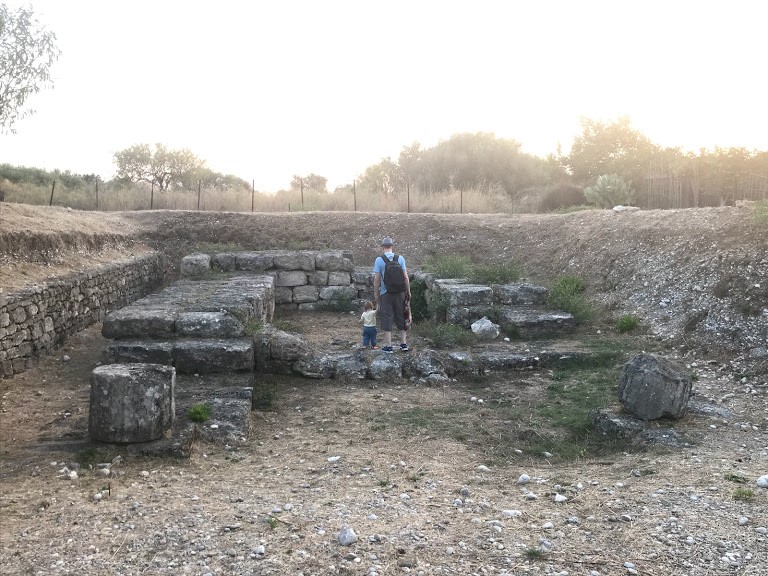Leto’s all-glorious son goes to rocky Pytho,
playing upon his hollow lyre,
clad in divine, perfumed garments;
and at the touch of the golden key his lyre sings sweet.
(From the Homeric Hymn to Pythian Apollo, possibly by Cynaethus of Chios, circa 522 BC)

Apollo is probably one of the better known Greek gods. Highly associated with the sun and prophecy, Apollo also personifies order and knowledge, healing and music, embodying the ideal of kalokagathia, a wholeness that comes from purity of body, morality, and spirituality.
Apollo is also a protector of children. The epithet Kourotrophos is taken by many ancient Greek gods, notably Hekate, Athena and Eileithyia. Kourotrophos means child nurturer and this epithet was given to gods who were known to care for or watch over children or young people, or to guide them in some way.
Who is Apollo?
Apollo is the son of Zeus, the king of the Olympian gods, and Leto, a Titan who was Zeus’s lover before he married Hera. After some dramatic and jealous behaviour by Hera, Leto finally and safely gave birth to Zeus’s children: first Artemis, goddess of the hunt and the moon, then nine days later, Apollo.
Apollo is a god in both Greek and Roman mythology, as he was one of the few deities who the Romans did not rename. However, his significance in Greek mythology is much more profound.
Why is Apollo associated with children?
In Apollo’s origin story, both he and his twin sister Artemis were in danger. Leto, their mother, with the help of the rainbow goddess Iris and the North Wind, Boreas, kept them safe and they were able to grow into fierce young adults. Even whilst still children, both Apollo and Artemis used their uncanny archery skills to protect their mother from both a dragon and a giant, showing a unified family and great love for each other.
In one of the ancient hymns to Apollo, the relationship between Apollo and those who were coming of age is clearly mentioned:
So, young men, prepare yourselves for singing and dancing.
Apollo appears not to all, only to the good.
He who sees him is great; who does not is lowly.
We will see you, Worker from Afar, and we will never be lowly.
Let the cithara not be silent.
Nor your step noiseless with Apollo approaching, you children,
If you intend to complete the marriage vows and to cut your hair,
And if the wall is to stand on its aging foundations.
Well done the youths; the strings are no longer at rest.
Some youths would often keep their hair long until their coming-of-age ceremonies. At this point, the long hair would be cut off and dedicated to Apollo.
Apollo is also linked to the education of the young, a combination of his power as a god of knowledge and his role as kourotrophos, protector of the young.
As a god of healing, he also looks after the health of young people, in particular their growth. His own son, Asclepius, was the god of medicine and rejuvenation, and was born with the help of Lachesis, one of the fates whose job it was to measure out the thread of each person’s life.
Honouring Apollo
I’m lucky enough to have been to two of Apollo’s temples, both on the island of Rhodes. The stunning acropolis on the hill in Rhodes city is topped by striking pillars, now covered with scaffolding. This is the Temple of Pythian Apollo, the epithet associated with Delphi and the oracles. This whole area resonates with splendour and awe.

In a much more rural spot in the village of Theologos, there’s a smaller temple which would also once have been grand and imposing, but is now mostly foundations and sections of pillars. This is the Temple of Apollo Erethimios, an epithet I have never found a translation for. I took my daughter and husband and we walked through what would have been the entrance to one of the main temple buildings, and I could imagine it being filled with priests and supplicants. My daughter was running around and nearly stuck her hand in a bush that was covered in the local paper wasps. I stopped her in time – or perhaps Apollo Kourotrophos was looking out for her.
If you want to honour Apollo, below are some ideas for decorating your altar or sacred space, or crafting a guided visualisation.
Apollo Correspondences
Animals
- Swan
- Python
- Wolf
- Mouse
- Deer
- Dolphin
Tools
- Lyre
- Plectrum
- Bow and arrow
- Laurel crown
- Three legged seat or stand known as a sacrificial tripod
Images
- The sun
- Trees
- Musical instruments, particularly stringed
- Colours of white, yellow or gold
What other deities do you associate with family and children? Pop over to our Facebook group and let us know.
Images either public domain or copyright Mabh Savage
